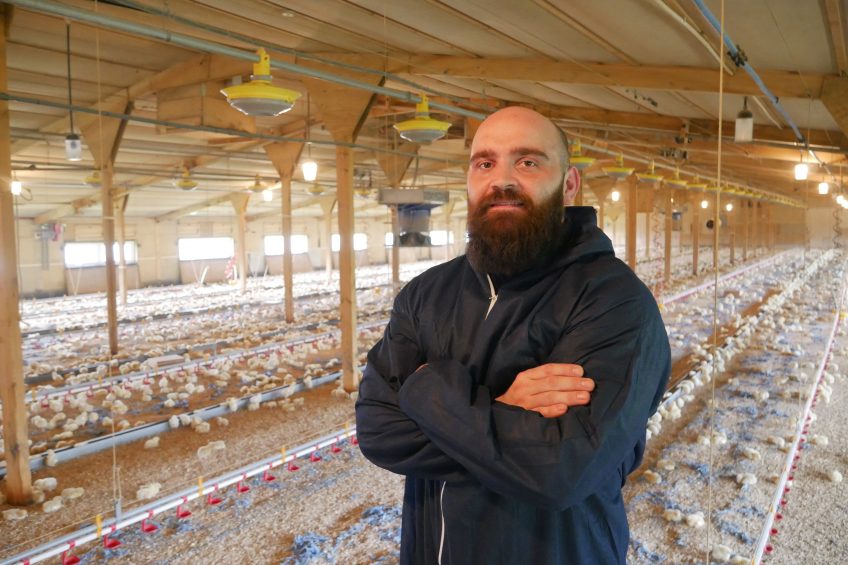The positive influence of a career in poultry

Joining the poultry sector was transformational for Sean Harrison and his young family. From a low salary and rented housing in Derby to fulfilling, well-paid work with accommodation provided. He tells Poultry World his story.
For all the stress, uncertainty and commitment that comes with farming, relatively few cut their links entirely with agriculture, regardless of what career they choose. The most successful may make a fortune in the city and buy a hobby farm in the home counties, while sons and daughters may flirt with other work but eventually ‘come back’, filled with ideas for diversifying their parents’ holding.
Eyes opened to new possibilities
Sean Harrison is the opposite; he spent the first decade of his working life in hospitality before a customer in the café he served at gave his first insight into the poultry industry. At the time, he lived with his partner and young family in, as he describes it, a ‘sketchy’ urban part of Derby. The café in which he worked was part of a high-end health club and one customer just happened to own a poultry farm.
“He opened my eyes to a different sort of career,” says Sean. “I spent a couple of evenings on his farm – completely different to my everyday experience.”
It was exciting, says Sean, explaining that not everyone gets the chance to see how chicken is grown. Far from a negative first impression, the experience gave Sean the impetus to begin applying for jobs in the poultry sector.
The first step to a career in poultry
After a few applications and subsequent interviews, success came in a job offer with Faccenda, which meant moving from Derby to Northamptonshire. “It was a massive move for the family – we left everything behind to move for this career.”
That success coincided with his honeymoon plans, and Sean’s eagerness to make a positive impression meant he postponed the trip in order to get started, in the beginning working as a relief assistant manager. “I was helping with the labour-intensive parts of the job and learning what I could.”
After that initial period, Sean was offered a position as an assistant manager. It was the housing offered that made the biggest difference. “Derby wasn’t the nicest place to bring up children, and we were renting. There were times when things were a bit sketchy, that’s when you do what you can to try and move away from that situation.
Lifestyle change
“The lifestyle change is a completely different story. It’s literally the other side of the coin. A great place to bring my children up.”
Financially the work is more rewarding, as well. Having housing provided took a major expense from Sean’s monthly outgoings, while the job itself paid not an inconsiderable amount more. His wife is able to stay at home, looking after their kids full time.
Managing a broiler/turkey farm
Another 18 months passed before Sean was offered a farm of his own to manage, close to Faccenda’s Brackley headquarters, with 5 sheds housing around 120,000 broilers. Once a year the farm switches to the turkey trade to produce birds for the Christmas business.
The challenge of turkeys
For Sean, managing turkey hens has been an interesting challenge. “Because you’re with them longer you get to know them – they have more of a personality.”
He adds that maintenance became more of a challenge given the birds have ‘more weight to push around’.
The avian influenza challenge
Another recent trial has been restrictions caused by avian influenza across the country adding complexity to his operation – Faccenda farms, like most others in the country, have allowed only absolutely essential visitors. For Sean it simply means more control over his holding. “We’re more vigilant. If anything it’s more beneficial, giving me more control and makes people coming onto my farm question why they are there. There’s not as much room for anyone to visit and cause cross contamination.”
It’s another pragmatic response, and helps sum up the attitude that saw Sean pick up 2 respected industry awards in 2016 (see below).
Given the impact he has made on the industry in the short time he has been involved – and the benefit in turn it has had on his young family – it’s not hard to see more success on its way in the coming years.
Trained in poultry management
“I received crucial training from some fantastic managers at Faccenda but also through Poultec,” says Sean. The reality is that most joining a poultry integrator at the farm management level these days will be taken through a comprehensive training programme outlining legal and welfare compliance measures, through the Poultry Passport scheme.
Sean attained his NVQ level 3 last year, and won a Poultec Excellence Award in doing so, for his dedication to learning.
He subsequently entered – and won – the British Poultry Council/Zoetis Trainee of the Year award, which offers a £1,000 grant to spend on further training (alongside a £500 prize from Poultry World).
Sean intends to spend his training funds on a ventilation course through Georgia University in the US, and is now pursuing further qualification through the Institute of Leadership and Management training. His ambitions for the future? “My aspiration is to become a more senior manager, working in part of technology integration, helping to bring farms that are less digital into a direction in which the more modern farms are heading to.”













